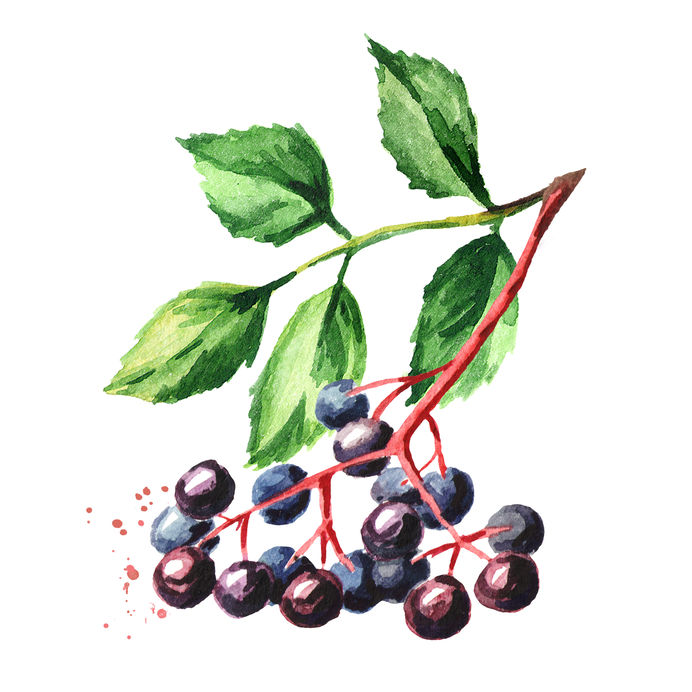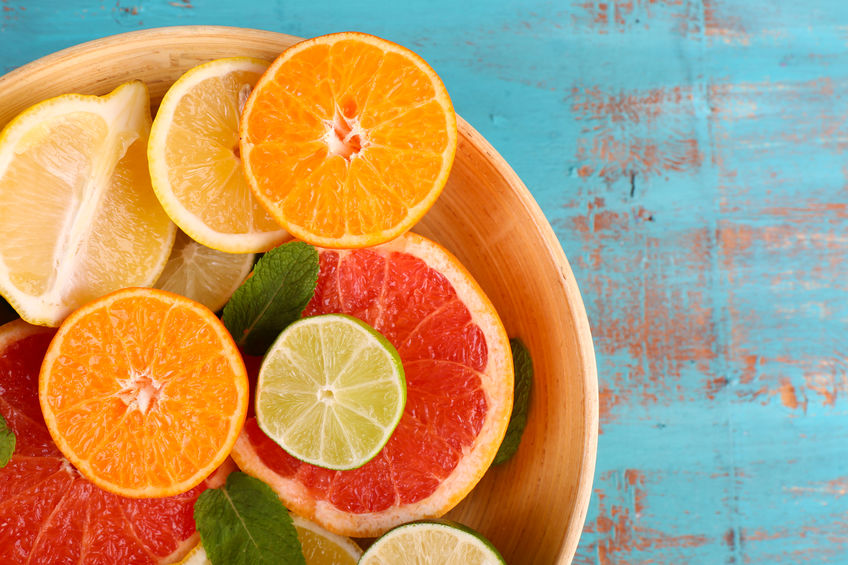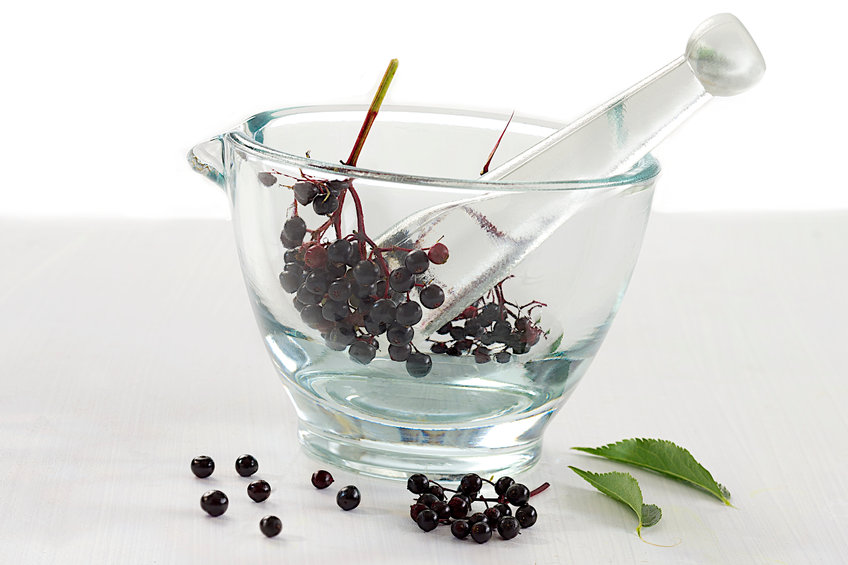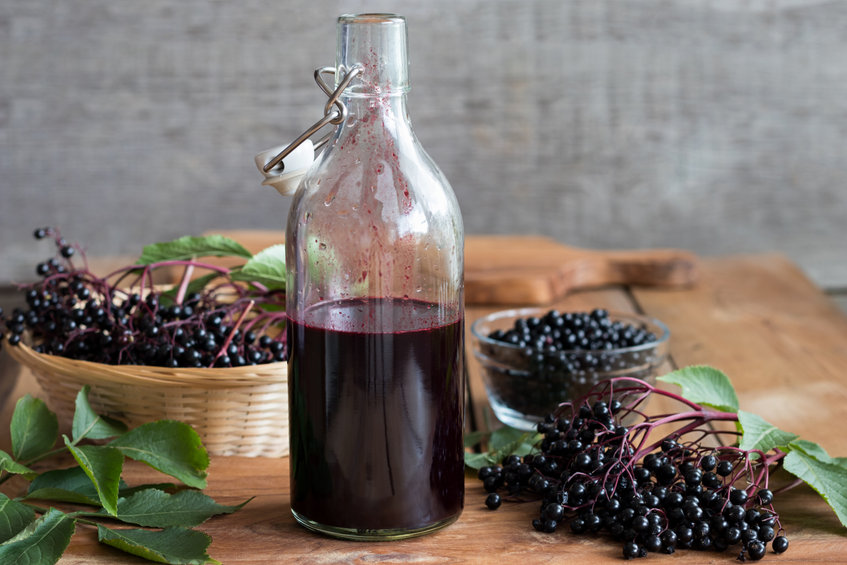Coming down with a cold or the flu can deliver a powerful blow to the immune system. Your muscles ache, your head feels heavy and stuffy, and that persistent fatigue knocks you straight off your feet for a couple of days. And if your immune system isn’t in top form, it takes a lot longer to fight off these nasty bugs and viruses. This is why many use natural immune system supplements as their first line of defense when they feel a cold coming on. There are countless options available on the shelves of your local health store ranging from vitamin C all the way to medicinal mushrooms like Turkey tail and cordyceps. One product that does seem to fly off the shelves during cold and flu season is elderberry – a plant that has a long-standing history in folk and traditional medicine.
Elderberry teas, lozenges, syrups, and gummies are commonly used to fight viral infections like the flu, reducing fevers, providing antioxidant and immune support as well as combating chronic fatigue to name a few benefits. Studies have even shown that during the 1995 flu pandemic, elderberry had a positive effect on alleviating symptoms and reducing recovery time. It is not surprising that this antiviral herb has been dubbed one of the best immune system supplements on the market.
While elderberry supplements have received a lot of praise, there are still a few skeptics out there who need hard facts and research before buying any type of medicinal product. And that is where we come in. We have outlined everything you need to know about elderberries and the science behind them. So if you are wondering if this plant really does help boost your immune system and fend off foreign invaders, keep reading.
What Is Elderberry?

Elderberry is a flowering plant that belongs to the Adoxaceae or, as it’s also known, the Moschatel family. There are several varieties of elderberry grown all over the world including the dwarf elder, antelope brush, and blue elderberry, but the most common is the black elder also known as the Sambucus nigra or European elderberry.
The European elderberry grows to over 30 feet tall and is also grown across North Africa, America, and Asia. The plant produces fragrant white flowers known as elderflowers and small blue-black berries. These berries have a tart profile and are used to make juice, wine, jam, pies, and chutney. The elderflowers are also used to make sweet syrups and teas.
In traditional medicine, the flowers and leaves were used for reducing inflammation, swelling, and pain while the bark was used to induce vomiting and to stimulate urination and sweating. The berries were used to alleviate toothache, relieve headaches and lower back pain, and were also used as a remedy for constipation.
Modern medicine has not strayed far from its folk foundation. The only difference is that scientists today have a lot more information about how the potent flavonoids and nutrients in the fruits and flowers of the black elderberry tree benefit us in so many different ways.
Nutritional Profile Of The Black Elderberry
The Black elderberry’s health benefits are owed to the fact that the plant is extremely nutritious. Not only are they packed with antioxidants, vitamins, and minerals but they also contain the highest concentration of phytonutrients (flavonoids) compared to other species of berries like goji berry, blackberry, and blueberry.
Black elderberry plants are rich in the following:
- Anthocyanins – These flavonoid compounds are what give the berries their rich coloring. They act as potent antioxidants that help to reduce inflammation and fight off free radicals.
- Vitamin C – Elderberries contain almost 60% of the recommended daily intake of vitamin C.
- Flavonols – isorhamnetin, quercetin, and kaempferol all have antioxidant properties. The elderflower is known to contain more than 10 times the amount of flavonols compared to the berries.
- Triterpenes – these are unique plant chemicals that have been found to slow down the growth of certain cancers. The black elderberry is rich in betulin, betulinic acid, ursolic acid, beta-amyrin, and oleanolic acid.
In addition to that, the black elderberry is also a rich source of:
- Fiber
- Vitamin A
- Vitamin B5
- Vitamin B6
- Folate
- Potassium
- Iron
- Calcium
- Zinc
- Copper
- Phosphorous
Depending on the way the flowers and plants have been prepared, some of these nutrients may be lost during the heating process.
The Science Behind Elderberry Immune System Supplements
Just by taking a glance at the nutritional profile of the black elderberry, it is easy to see why it is still relevant in modern medicine and why scientists are dedicating more time and money to researching the various health properties of this plant. From fighting pathogens and infections to curbing cold and flu symptoms, the results are astounding. But don’t just take our word for it, let’s take a closer look at what the research says about the positive health effects.
The Research on Elderberry’s Immunity Boosting Properties
Various studies have found that the European elder acts as an immune modulator meaning that it helps to restore, activate, or improve immune function after it has been compromised.

In human studies, the anthocyanins found in black elderberry have been shown to stimulate the immune system and boost immune defense by increasing the secretion of various inflammatory cytokines (signaling molecules) such as Interleukin-10 in order to activate lymphocytes (immune cells) to help fight infections and build immunity to various pathogens. Elderberry extract also helps to increase the production of white blood cells, which helps the body attack and destroy bacteria and viruses.
Elderberry and elderflowers have also shown positive effects on suppressing an overactive immune system that can lead to autoimmune diseases by inhibiting the overproduction of nitric oxide in cells.
The Research On Using Elderberry For Flu And Cold Relief
Most of the studies conducted on elderberries outline the various mechanisms and positive effects on the common cold and various influenza strains. For example, in one study published in 2016, the research found that Sambucus nigra extract reduced the duration of cold symptoms in travelers. The participants of the study used the extract daily for ten days prior to intercontinental travel and continued to supplement four days after arriving at their destination. The travelers in the placebo group reported more cold episodes than those in the elderberry group. The placebo group also experienced cold symptoms for a longer period of time compared to the elderberry group who experienced a two-day shorter duration of cold symptoms.
Other publications have also shown the effectiveness of elderberry extract on various flu virus strains such as the H1N1 influenza and H5N1 avian influenza strain.
A study published in the Journal of International Medical Research evaluated the efficacy of elderberry on 60 patients between the ages of 18 and 54 years old who were suffering from Influenza A and B symptoms. The study found that participants who had received 15 ml of elderberry syrup four times a day had recovered from symptoms 4 days earlier than those who had received a placebo.
Both Influenza A and B viruses are responsible for the seasonal flu epidemics we face every year and the research points to elderberries for providing relief from both these strains by binding to the viruses that enter the body and inhibiting them from entering into the cells and multiplying further.
The Research On Using Elderberry For Sinus Infections
Another seasonal condition most of us are prone to is sinusitis or an infection of the sinuses. It can be brought on by allergies or bacteria and can leave us feeling just as crummy as we would during a cold or flu episode. Elderberries are a cheap and effective way to get relief thanks to its anti-inflammatory and antiviral properties.
Clinical studies have shown that elderberry extract helps to inhibit the growth of a bacteria called Helicobacter pylori that causes the infection in the maxillary sinus tissues and also leads to chronic bronchitis.
The Research On Elderberry’s Antioxidant Properties

One of the reasons elderberry is a fantastic immune system supplement is because of its powerful antioxidant properties. Our cells are constantly under attack from harmful oxidative stress, which leads to the death of cells and ultimately leads to diseases such as cancer and type 2 diabetes. Antioxidants are incredible compounds found in vegetables and fruits that help protect the cells from damage and help to ward off chronic illnesses. The more antioxidants we have in our diets, the fewer cells are destroyed by refined foods, pollution, and other external factors.
To put it into perspective of just how rich in antioxidants the black elderberry plant is, the anthocyanins found in the elderberry fruits have 3.5 times more antioxidant power in comparison to vitamin E.
One study reveals that participants who drank 400 ml of elderberry juice had a significantly higher level of antioxidants in the urine after one hour of ingesting the juice.
The Research On How Elderberry Regulates Blood Sugar Levels
Both the fruit of the black elderberry and the elderflower can help to lower and regulate blood sugar levels. According to what the studies show, elderflower extracts promote insulin secretion and encourage glucose metabolism. According to a study published in the Journal of Nutrition in 2000, scientists discovered that elderberries increased glucose mobility, oxidation, as well as glycogenesis without the presence of added insulin. Another study suggests that black elderberries show promise in managing type 2 diabetes due to its bioactive compounds, which have shown to decrease insulin resistance in diabetic rats.
The Research On Elderberry and Cardiovascular Health
Besides being a potent and effective immune system supplement, research has shown that the black elderberry also has a positive effect on cardiovascular and vascular health.
Numerous studies have shown that a diet that consists of high levels of anthocyanins reduces the risk of developing cardiovascular disease. Additionally, research has also found that the berries of the European elder reduce cholesterol levels as well as blood triglyceride and fat buildup levels. In one study, participants who drank black elderberry juice for a period of weeks had a reduction in cholesterol levels as well as a decrease in oxidative stress when compared to the placebo group. Both cholesterol and oxidative stress are contributing factors behind heart disease, heart attacks, and strokes.
In addition to protecting the heart from oxidative damage and the arteries from the buildup of plaque, the black elderberry also helps to reduce levels of uric acid in the body, which has been linked to various disorders of the heart and high blood pressure.
The Other Benefits of Elderberry
According to research, black elderberry can also be beneficial for:
- Reducing ulcers caused by bacteria
- Combating depression and elevating the mood
- Improving IBD
- Boosting skin health
- Relieving constipation
- Reducing the risk of certain cancers
Is It Safe To Prepare My Own Elderberry Tonic?

Based on the research that has been presented, it is clear that elderberries are the perfect addition to a healthy lifestyle. But before purchasing these berries and feeding them to the family, there are a few dangers you should know about the raw plant.
The unripe or raw flowers, bark, and berries of the elderberry plant contain sambunigrin and cyanogenic glycosides, which are toxic compounds that can lead to cyanide poisoning if eaten in excess. Eating raw seeds and berries can cause symptoms such as nausea, vomiting, and diarrhea. Additionally, raw or unripe berries and seeds of the elder plant also contain lectins, which can cause stomach distress.
As we mentioned at the beginning of this article, there are many different types of elderberry species, and some are more toxic than others. According to one report published in California, eight people fell ill after consuming the juice from the fruit, leaves, and branches of the S. Mexicana elder species. The report also states that the individuals suffered from stupor, nausea, vomiting, dizziness, fatigue, and numbness.
The toxins in the plant can be removed by cooking them, however, if you are not an expert on the different elder species and how to prepare them correctly, it is best to combat colds and the flu by sticking to elderberry immune system supplements that have been tried and tested according to FDA regulations in order to avoid any adverse reactions and side effects.
Where Can You Buy Elderberry Immune System Supplements?
Approved Science® Immune Booster is a dietary supplement carefully formulated with key ingredients, each chosen for their potential to bolster the body’s natural defenses. The product incorporates:
Elderberry (Sambucus Nigra), which is a potent source of antioxidants and vitamins known to enhance immune function and alleviate cold and flu symptoms.
Echinacea (E. Purpurea) is another major component that has been popularly used over centuries for its demonstrated ability to increase the number of white blood cells, thereby assisting the body in combating infections.
Garlic (Allium Sativum) is included for its rich variety of compounds, such as allin, which have the potential to positively influence immunity and help the immune system fight off germs.
Vitamin C, a powerful antioxidant, aids in building immunity, and modulating the body’s resistance to infections and viruses, ultimately reducing the risk, severity, and duration of such ailments.
Finally, Zinc, an essential trace mineral, is added to stimulate the activity of T cells that control and regulate immune responses, thereby ensuring optimal immune system function. Lack of Zinc can critically impair immune function, making its inclusion vital to this immune-boosting formulation.
Making the right choices about the manufacturer and the quality of ingredients ensures that you get an effective product without running the risk of side effects from potentially harmful ingredients. When it comes to elderberry formulas, it is important to also avoid homeopathic formulas or purchasing from manufacturers who don’t have a reputable track record. These products usually don’t contain standardized extracts and since the raw or unripe plant can be toxic, you don’t want to risk buying a product that has not been prepared and cooked thoroughly.
Who Should Avoid Taking These Immune Supplements?
While there are no adverse side effects reported from taking a high-quality elderberry supplements, if you are pregnant, lactating, or have any medical condition, it is always best to speak to your doctor before taking any supplement. Due to elderberry’s immune-boosting qualities, it’s best to avoid these supplements if you are on corticosteroids or any immunosuppressive therapy.
Other drug interactions may include:
- Diuretics
- Diabetes medications
- Theophylline
- Laxatives
- Chemotherapy
The Bottom Line

Based on the research and countless clinical trials and studies conducted, it is safe to say that black elderberry extract is an immune system supplement that is worthy of the praise it has received. From fighting colds and flu to combating harmful bacteria and curbing inflammation, there is no denying that the potent antioxidant properties of the elderberry are something we can all benefit from. If you want to add more elderberries to your diet, we recommend researching how to cook and prepare them properly since raw unripe plants contain harmful toxins. If you would rather save yourself the time and want a quick and safe way to reap the benefits of black elderberries, try Approved Science® Immune Booster today!

